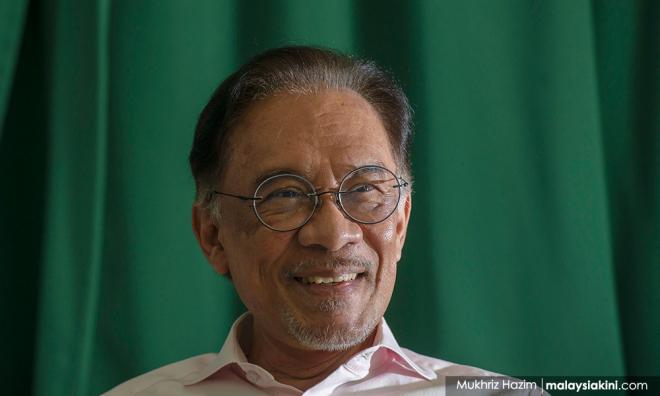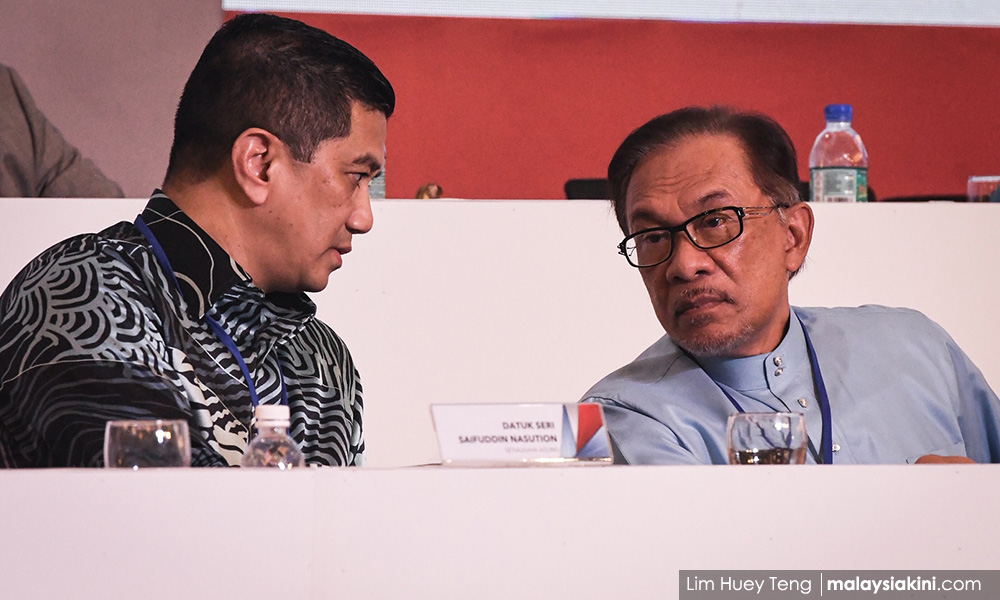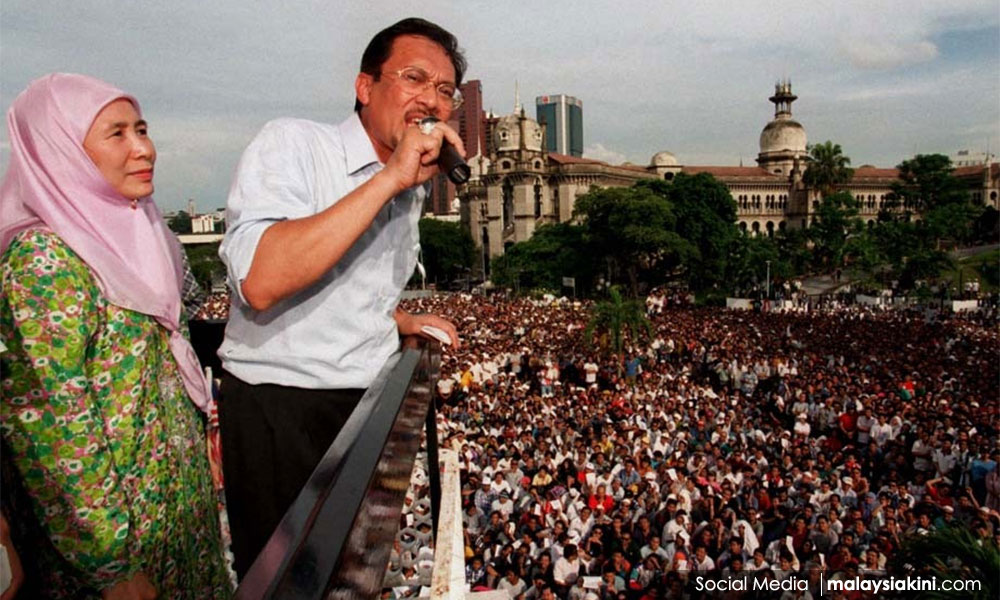
PKR needs to be honest about Anwar
by James Chai
There is a myth around Anwar Ibrahim that is understandable. A man who had to endure unjust convictions and ruthless political incursions carries with him an aura unfathomable to ordinary people, like there was something untouchable – belonging to a different dimension altogether.
When Anwar walked out of prison in 2018, Malaysians from all walks of life rushed to see the man who has walked to hell and back. It all started from his meteoric ascendency en route to the prime ministership, sparking one of the greatest movements in Malaysian history, "Reformasi".
His first steps out of prison also crystalised his status as the country's first-ever prime-minister-in-waiting. "Two years"; its supporters treated the handover promise as sacrosanct. Dr Mahathir Mohamad must hand over in two years so that the myth of Anwar could finally be realised.
But it was a double-edged sword. The mythical status of post-conviction Anwar slowly evolved into a burden for well-meaning reformists. It became extremely difficult to hold onto the reform mindset when people around you were exploiting and paddling on Anwar's myth.
The opportunists surrounding the first-ever prime-minister-in-waiting
First, there were the opportunists. They understood that they must pay homage to the unprecedented office of the prime-minister-in-waiting. If they could make their presence known and Anwar feels indebted to them, when Anwar finally becomes prime minister, they would strike gold.
The opportunists were willing to put in whatever they have for Anwar because they see their sacrifices now as investments. Chief among others was their duty as a badger to defend Anwar against any outside criticisms.
The simple rule was that anyone who challenges Anwar is a threat, and anyone who is not in full agreement with Anwar is a traitor. Serving the agenda of making Anwar prime minister at all costs was essentially serving their own agenda of success.
Consequently, this fostered a culture of subservience and subjugation, where Anwar's opinions and stance ought not to be challenged; disagreements, concerns and criticisms are reduced to mere whispers.
When Anwar walked out of prison in 2018, Malaysians from all walks of life rushed to see the man who has walked to hell and back. It all started from his meteoric ascendency en route to the prime ministership, sparking one of the greatest movements in Malaysian history, "Reformasi".
His first steps out of prison also crystalised his status as the country's first-ever prime-minister-in-waiting. "Two years"; its supporters treated the handover promise as sacrosanct. Dr Mahathir Mohamad must hand over in two years so that the myth of Anwar could finally be realised.
But it was a double-edged sword. The mythical status of post-conviction Anwar slowly evolved into a burden for well-meaning reformists. It became extremely difficult to hold onto the reform mindset when people around you were exploiting and paddling on Anwar's myth.
The opportunists surrounding the first-ever prime-minister-in-waiting
First, there were the opportunists. They understood that they must pay homage to the unprecedented office of the prime-minister-in-waiting. If they could make their presence known and Anwar feels indebted to them, when Anwar finally becomes prime minister, they would strike gold.
The opportunists were willing to put in whatever they have for Anwar because they see their sacrifices now as investments. Chief among others was their duty as a badger to defend Anwar against any outside criticisms.
The simple rule was that anyone who challenges Anwar is a threat, and anyone who is not in full agreement with Anwar is a traitor. Serving the agenda of making Anwar prime minister at all costs was essentially serving their own agenda of success.
Consequently, this fostered a culture of subservience and subjugation, where Anwar's opinions and stance ought not to be challenged; disagreements, concerns and criticisms are reduced to mere whispers.

A culture of subservience – an army of "yes men" – opened up the doors to internal betrayal. Azmin Ali led the orchestra of weakening the party for his personal gain. Although there were warning signs of Azmin's malicious manipulations, these did not result in any mitigating steps before they were too late.
Against the reformists' advice, Anwar decided to hold a ceasefire with Azmin a day before the PKR congress, which led to Azmin taking the opportunity to publicly fracture the party into two. Azmin brought his faction to provoke the party congress and held a parallel congress that was essentially a round of insults, slurs, and provocation.
Azmin's subsequent steps of migrating his allies from PKR into Muhyiddin Yassin's arms was a direct result of the culture of opportunists. It became acceptable in the party to sideline party struggles and prioritise steps to obtain power. All means are justified as long as they serve the ends.
The quasi-reformists who are willing to give everything away
Secondly, there were the quasi-reformists. They are not people who only entered the picture when Anwar came out of prison, but they are not the true breed of reformists.
They understand Reformasi as Anwar becoming prime minister and solving the nation's woes with a stroke, and they believe this should happen without conditions. Their whole life's mission was to live the day to see Anwar as prime minister – since the victimisation against him since 1998 could only be resolved through this fashion.
Against the reformists' advice, Anwar decided to hold a ceasefire with Azmin a day before the PKR congress, which led to Azmin taking the opportunity to publicly fracture the party into two. Azmin brought his faction to provoke the party congress and held a parallel congress that was essentially a round of insults, slurs, and provocation.
Azmin's subsequent steps of migrating his allies from PKR into Muhyiddin Yassin's arms was a direct result of the culture of opportunists. It became acceptable in the party to sideline party struggles and prioritise steps to obtain power. All means are justified as long as they serve the ends.
The quasi-reformists who are willing to give everything away
Secondly, there were the quasi-reformists. They are not people who only entered the picture when Anwar came out of prison, but they are not the true breed of reformists.
They understand Reformasi as Anwar becoming prime minister and solving the nation's woes with a stroke, and they believe this should happen without conditions. Their whole life's mission was to live the day to see Anwar as prime minister – since the victimisation against him since 1998 could only be resolved through this fashion.

Contrasted to this are the true reformists. They understood that Reformasi represents an overall political struggle that is beyond Anwar. They see institutional reforms – the need for independence, integrity, intelligence – and the pursuit of justice as being necessary and all-encompassing.
The smells of injustice, poverty, unfairness irate them; the slowness of bold reforms frustrate them; the compromises in the pursuit of power disturbs them. They see Anwar as a part of the struggle, whereas the quasi-reformists see Anwar as the struggle.
The main problem quasi-reformists bring is that it blurs the boundary of principles for the party. Absorbing Mahathir's blows were tolerable as long as the agreement for handover remains unbroken.
Ignoring Azmin's posse and their detrimental ways was preferable as long as Anwar remains president. Working with Umno's scandal-ridden individuals is justified so long as it helps bring Anwar closer to the throne.
This is where we get to the heart of the problem. The true reformists of PKR – who have spent years campaigning and organising, putting a physical, financial, and mental stake into the game, taking nothing for themselves but an idealistic and stubborn aspiration and a few good friends – were stuck between a rock and a hard place.
They could not speak out against the questionable actions that regress the party's struggles, taken by a man they once deemed a hero; nor could they call themselves a true reformist for silencing themselves for the shallow benefit of party discipline.
As a party, PKR has lost not only members who have betrayed them; they have also lost members who were frustrated by the posturing of leaders who would give up on the principles they hold dear.
Now they are on the verge of losing well-meaning, good-hearted true reformists, who see the party they helped build slowly concede to the dirty dreams of pragmatism and political convenience.
Because the narrative has now changed: A true-blue reformist is one who does not disagree with Anwar.
JAMES CHAI is a legal consultant and researcher working for Invoke, among others. He also blogs at jameschai.com.my. You may reach him at jameschai.mpuk@gmail.com
The smells of injustice, poverty, unfairness irate them; the slowness of bold reforms frustrate them; the compromises in the pursuit of power disturbs them. They see Anwar as a part of the struggle, whereas the quasi-reformists see Anwar as the struggle.
The main problem quasi-reformists bring is that it blurs the boundary of principles for the party. Absorbing Mahathir's blows were tolerable as long as the agreement for handover remains unbroken.
Ignoring Azmin's posse and their detrimental ways was preferable as long as Anwar remains president. Working with Umno's scandal-ridden individuals is justified so long as it helps bring Anwar closer to the throne.
This is where we get to the heart of the problem. The true reformists of PKR – who have spent years campaigning and organising, putting a physical, financial, and mental stake into the game, taking nothing for themselves but an idealistic and stubborn aspiration and a few good friends – were stuck between a rock and a hard place.
They could not speak out against the questionable actions that regress the party's struggles, taken by a man they once deemed a hero; nor could they call themselves a true reformist for silencing themselves for the shallow benefit of party discipline.
As a party, PKR has lost not only members who have betrayed them; they have also lost members who were frustrated by the posturing of leaders who would give up on the principles they hold dear.
Now they are on the verge of losing well-meaning, good-hearted true reformists, who see the party they helped build slowly concede to the dirty dreams of pragmatism and political convenience.
Because the narrative has now changed: A true-blue reformist is one who does not disagree with Anwar.
JAMES CHAI is a legal consultant and researcher working for Invoke, among others. He also blogs at jameschai.com.my. You may reach him at jameschai.mpuk@gmail.com
who is reformist? any name?
ReplyDelete